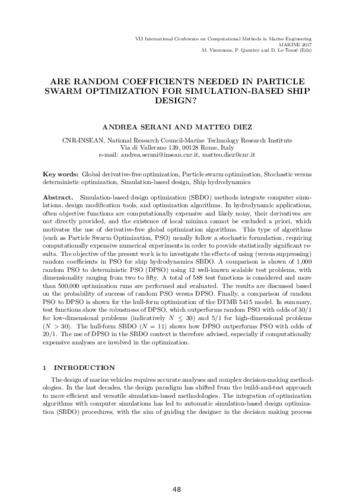Mostra el registre d'ítem simple
Are random coefficients needed in particle swarm optimization for simulation-based ship design?
| dc.contributor.author | Serani, Andrea |
| dc.contributor.author | Diez, Matteo |
| dc.date.accessioned | 2020-10-15T16:21:46Z |
| dc.date.available | 2020-10-15T16:21:46Z |
| dc.date.created | 2017 |
| dc.date.issued | 2017 |
| dc.identifier.citation | Serani, A.; Diez, M. Are random coefficients needed in particle swarm optimization for simulation-based ship design? A: MARINE VII. "MARINE VII : proceedings of the VII International Conference on Computational Methods in Marine Engineering". CIMNE, 2017, p. 48-59. ISBN 978-84-946909-8-3. |
| dc.identifier.isbn | 978-84-946909-8-3 |
| dc.identifier.uri | http://hdl.handle.net/2117/330337 |
| dc.description.abstract | Simulation-based design optimization (SBDO) methods integrate computer simu- lations, design modification tools, and optimization algorithms. In hydrodynamic applications, often objective functions are computationally expensive and likely noisy, their derivatives are not directly provided, and the existence of local minima cannot be excluded a priori, which motivates the use of derivative-free global optimization algorithms. This type of algorithms (such as Particle Swarm Optimization, PSO) usually follow a stochastic formulation, requiring computationally expensive numerical experiments in order to provide statistically significant re- sults. The objective of the present work is to investigate the effects of using (versus suppressing) random coefficients in PSO for ship hydrodynamics SBDO. A comparison is shown of 1,000 random PSO to deterministic PSO (DPSO) using 12 well-known scalable test problems, with dimensionality ranging from two to fifty. A total of 588 test functions is considered and more than 500,000 optimization runs are performed and evaluated. The results are discussed based on the probability of success of random PSO versus DPSO. Finally, a comparison of random PSO to DPSO is shown for the hull-form optimization of the DTMB 5415 model. In summary, test functions show the robustness of DPSO, which outperforms random PSO with odds of 30/1 for low-dimensional problems (indicatively N ≤ 30) and 5/1 for high-dimensional problems (N > 30). The hull-form SBDO (N = 11) shows how DPSO outperforms PSO with odds of 20/1. The use of DPSO in the SBDO context is therefore advised, especially if computationally expensive analyses are involved in the optimization. |
| dc.format.extent | 12 p. |
| dc.language.iso | eng |
| dc.publisher | CIMNE |
| dc.rights | Open access |
| dc.subject | Àrees temàtiques de la UPC::Matemàtiques i estadística::Anàlisi numèrica::Mètodes en elements finits |
| dc.subject.lcsh | Finite element method |
| dc.subject.lcsh | Marine engineering |
| dc.subject.other | Global derivative-free optimization, Particle swarm optimization, Stochastic versus deterministic optimization, Simulation-based design, Ship hydrodynamics |
| dc.title | Are random coefficients needed in particle swarm optimization for simulation-based ship design? |
| dc.type | Conference report |
| dc.subject.lemac | Enginyeria naval |
| dc.rights.access | Open Access |
| local.citation.contributor | MARINE VII |
| local.citation.publicationName | MARINE VII : proceedings of the VII International Conference on Computational Methods in Marine Engineering |
| local.citation.startingPage | 48 |
| local.citation.endingPage | 59 |


